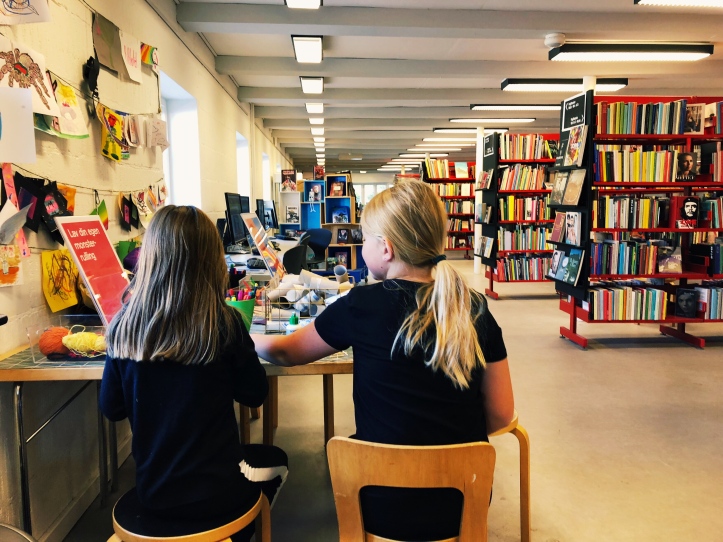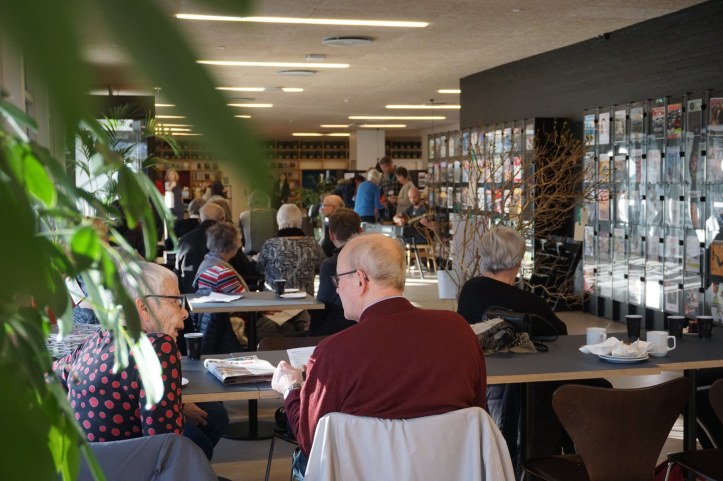
“To ask why we need libraries at all, when there is so much information available elsewhere, is about as sensible as asking if roadmaps are necessary now that there are so many roads” – Jon Bing
The late Norwegian author and professor of law, Jon Bing, makes an excellent point in the quote above but still the legitimacy and value of libraries across the world are constantly at question. For a public institution, such as a library being debated is not a bad thing – it is important for the development of libraries that there is a sound and constructive public discussion about were the institution is heading and why and how it matters and makes a positive change in peoples lives. But the problem to my opinion is that the debate often finds its fuel in the wrong arenas.
In Denmark, the debate about public libraries often gets an extra spark when the annual library statistics comes out which is always followed by a choir of opinions about the state and future of libraries; If the statistics shows that the national lending numbers are dropping libraries and the physical book are dying. Are the numbers of foot traffic increasing it is often followed by a debate that libraries are trying to be cultural houses and should focus on being houses of literature instead and so on.
Library statistics are important but the problem with this debate is, that lending numbers, downloads and foot traffic says something about the use of libraries but they don’t really say something about the value and impact that libraries brings to communities. After all we don’t know if citizens actual read the books they are lending to put it at the extremes.
Governments and municipalities should intuitive understand the value of citizens being presented with something that connects them to others and foster curiosity, insight and a critical sense but they often seems not to. Instead, decision makers and people of opinion often grab for figures and statistics and things that can be measured to call judgments on libraries and other institutions of culture and learning. And library professionals often ends up in the same corner of that party.
And that is a problem because new public management is a game libraries can not win and the value of libraries can’t be extended from statistics alone. So at Roskilde Libraries we have decided to launch a project that aims to develop a more nuanced understanding of the value that public libraries brings to citizens and societies. We want to create a new language for talking about the value and impact of libraries.
We have launched the project in June 2020 and below is an outline of the project game plan. More blog posts will follow as the project evolves.
The project

The project has an explorative and investigative character that puts the citizens in center and has two overall aims:
- To develop a new arena for the dialogue with decision makers and politicians
- A open source tool kit so different libraries can carry out similar investigations in different contexts
The first aim wants to move the public debate about the value of libraries away from lending numbers and other measurements to insight in the actual value and impact that libraries brings to citizens and communities and to kick-start a new conversation about the success and legitimacy of public libraries. It is important to make clear that w do not want to find a way to measure culture or library impact since I don’t find that very mearningful since that would be trying to play ball on the new public mangement arena.
The second aim wants to give other libraries a chance to carry out similar investigations but in different scope and contexts. Libraries and the communities they serve are different and the investigation for this project will be a snapshot of time and context and to make the ambition for a new language to talk about the value of libraries sustainable, we find it significant to make sure that others can carry out similar work and projects.
A nuanced understanding of the value of libraries to citizens should be based on a holistic perspective, as the value can have many different facets. For one citizen it can be the immersion and the formation through literature and music that is valuable while the other citizen has greater joy of digital offerings and skills acquisition. A third citizen experiences the library as a social meeting place, while a fourth experiences the library as a place where children can play and learn. Last but not least, libraries also have value for those citizens who do not use them because they appreciate having the opportunity or that others can take advantage of it. In that way, the libraries value for citizens is a diverse size, which requires a nuanced survey design to uncover.
The design of the survey will be based on a combination of quantitative and qualitative methods to ensure both breadth and depth in the study.
Roskilde Libraries will carry out the project in the role as one of Denmark’s 6 regional central libraries (Denmark has 6 regional central libraries which together function as a national structure for library materials and library development) and will do it in collaboration with consultants of cultural experiences Seismonaut which has significant experience workning with different kinds of cultural impact.
The project that runs from June 2020 until the end of 2020 contains 4 key phases:
- Establishing the foundation
- Collecting data
- Analysis
- Anchorage and communication
Establishing the foundation means developing the conceptual framework for the survey. This foundation is created by expert interviews, desk research and a project library task force to qualify and be critical about the proposed framework. The conceptual framework will form the platform for the data collection.
The data collection will be carried out as a representative survey questionnaire among 1000 Danish citizens. The respondents are picked out from a random sample method which is approved for quantitative research. The questions in the survey are developed on the basis of the establishing the foundation part of the project. The quantitative survey will be combined with qualitative interviews and field studies.
The analysis will extract findings from the data collection, describe and communicate them and develop the open source tool kit for others to use.
Anchorage and communication will be aiming at getting the results of the projects launched nationally to successfully foster a new language to talk about the value of libraries.
The method of the project as carried out by Seismonaut is build on inspiration from “Understanding the value and impact of cultural experiences: A literature review” by Carnwarth and Brown (2014) and the notion that “Arts participation has emotional, intellectual, aestehsitc and social dimensions and should be evaluated accordingly”. In the project ‘aesthestic’ will be replaced with ‘creative’ which fits more to the reality of Danish public libraries and those 4 dimensions will play a key role in the project survey and analysis.
Like any project of explorative character we don’t know what we will find but I’m positive that this project one way or the other will fuel an important and more nuanced debate about the value and impact of libraries.
I’m thrilled about this. Stay tuned


Public Libraries in The county of Kent in the UK have been systematically collecting outcome data as well as metrics for the past four years and their methodology has been shared with a number of other library authorities over the past 3 years. Please contact me for more information
LikeLike
Hi Darren, thanks for sharing this. I would love to see your work and results
LikeLike
[…] https://christianlauersen.net/2020/07/21/wanted-a-new-language-for-the-value-and-impact-of-libraries… […]
LikeLike
I recently listened to Mariana Mazzucato who talks about value creation as opposed to merely value extraction and how government doesn’t get the credit it’s due for the value it creates where it operates.
An immediate example is the amount of information/guides a library generates to help users understand the options available to them. Obviously there’s so much more, and I very much look forward this research!
LikeLiked by 1 person
Thanks for sharing those thoughts! I highly agree
LikeLike
[…] Quelle / weitere Informationen […]
LikeLike
Thanks Christian!
Here in the U.S., specifically Baltimore, MD, we have this debate amongst our colleagues all the time as well with the Baltimore County government. I am a circulation assistant at BCPL, Baltimore County Public Library.
I hope your project goes well so we can use some of your techniques and ideas in our Library system.
LikeLiked by 1 person
Thanks, Dana!
LikeLike
[…] We need insights and understandings beyond statistics to have a sound and constructive debate about why libraries matters and how we should shape them to lift future challenges. That is why Roskilde Central Library together with Seismonaut has taken on the task to create a new language for value and impact of libraries – read more about the thoughts and ambition in this earlier Library Lab blog post: https://christianlauersen.net/2020/07/21/wanted-a-new-language-for-the-value-and-impact-of-libraries… […]
LikeLike
[…] Ambition: https://christianlauersen.net/2020/07/21/wanted-a-new-language-for-the-value-and-impact-of-libraries… […]
LikeLike